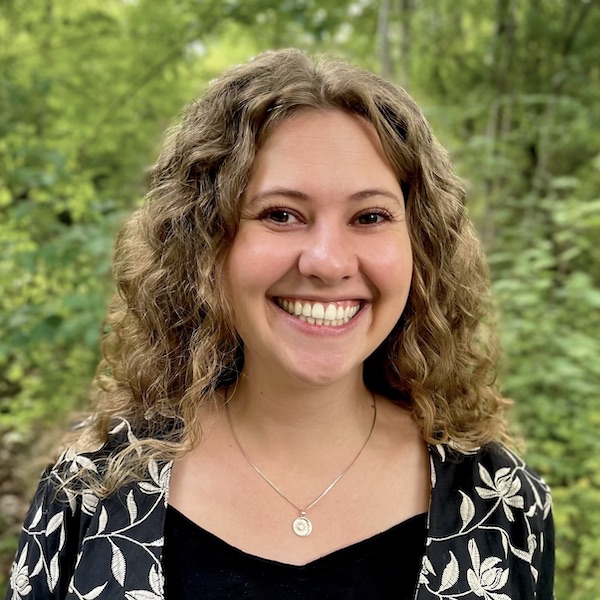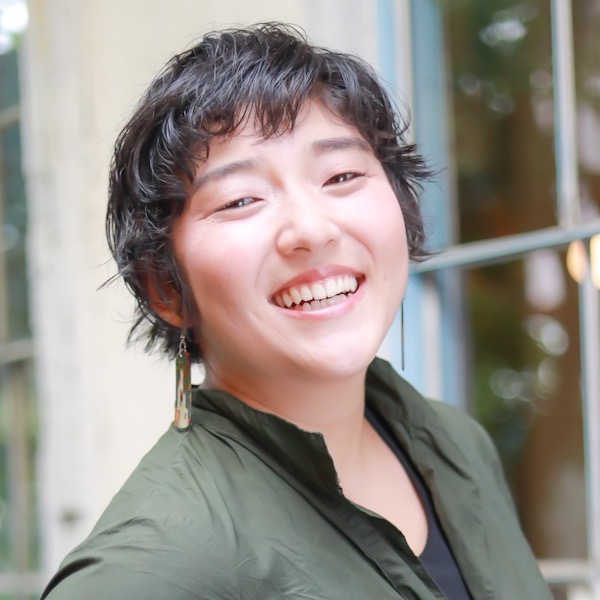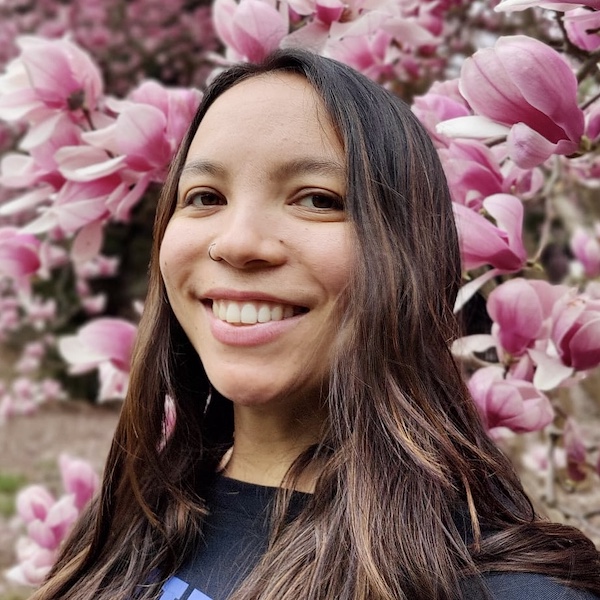Above: participants in CARE International Uganda’s Farmer Field Business School project discuss kitchen gardening at a demonstration plot in the Kyaka II refugee settlement. 📸: CARE International Uganda
The 12th Class of Mickey Leland International Hunger Fellows have been working with their host organizations since last October. We asked three of them to describe what they’ve been working on and how their project will improve food security in the community where they’ve been placed. Read on for updates from fellows working in Tajikistan and Uganda.

Examining poultry as part of a nutrition & income intervention in Tajikistan. 📸: Sarah Pechtl.
Uncovering How Gender Influences Diet in Tajikistan
“Poverty looks different here than in many places,” says Leland Fellow Sarah Pechtl of her placement in Dushanbe, Tajikistan. “Most people have houses and food to eat. Food insecurity is an issue, but the greater problem is nutrition insecurity.”
Many Tajiks live in traditional multi-generational households, where hierarchy among family members determines the order and amount that members are served at mealtimes. While an average meal will contain sufficient calories, the more nutritious items like vegetables will be reserved for the men of the household. As a result, women and children are more likely to experience undernutrition, or “hidden hunger,” which is linked to developmental issues.
Sarah has been placed with IFPRI, where she has been creating blog posts, policy briefs, and summaries to share the organization’s research with local NGOs and government. She is also travelling to twelve villages in the southwestern province of Khatlon to conduct original research. There she will collect information about the effect of gender roles on household behaviors and malnutrition using traditional focus groups and a new “photo voice” method, which she introduced into the plan.
Photo voice involves giving cameras to participants, inviting them to document their day-to-day lives, including their food intake. This record of their personal experiences will add context to the data the survey collects.
Research on the impact of gender differences on nutritional wellbeing is challenging because it requires an invitation into some of the most personal or sensitive topics in a household. These discussions could include religious beliefs, traditional customs, gender-based roles, and men’s emigration to work for remittances, which is hollowing out the male population in rural areas.
“There could be a variety of topics—some very sensitive and very private—that come up. We’re trying to figure out how to not only respect but support the individuals who share this information; not just collect it and move on to the next village.”

Leland Fellow Chika Kondo (standing, third from right) with participants in the Urban Food Hives project in Kampala, Uganda.
Building Nutrition in Tight Spaces
When families are displaced, either across borders due to conflict, or internally due to economic pressures, their ability to access nutritious food suffers. While diets may be sufficient in calories from carbohydrate-rich commodity aid or fast food in urban environments, fruits and vegetables are often lacking, which can lead to malnutrition. One solution for improving access to nutritious food is to grow it at home—but for people living in cramped settings, whether in refugee settlements or in the nation’s capital, this requires shifts in mindsets and changes in practices.
Leland Fellow Chika Kondo is putting her background in agriculture and agroecology to use in Uganda, where she is working with Oxfam Uganda to help families in refugee settlements and displaced people in urban areas, mainly women and youth, supplement their diet with food they grow for themselves.
Every month about one thousand refugees enter Uganda, fleeing conflicts in Sudan, South Sudan, Democratic Republic of Congo, Burundi, and Somalia. Uganda’s current open-door policy grants registered new arrivals with 30m2 allotments of land (roughly the size of an average American one-car garage) to live on. Many refugees are eager to grow their own food, but face challenges understanding what to grow in their new environment, and accessing the appropriate seeds, fertilizers, tools, water, and other inputs. Chika supports these farmers by helping them troubleshoot their work and suggesting improved practices, including the use of drought-tolerant and local varieties of seeds.
Chika is also supporting Oxfam’s Urban Food Hives project, launched in five countries amid growing concerns about food security in urban areas in developing countries. In these contexts physical access is not the most significant problem; Kampala, for instance, boasts 150 food markets for 1.6 million residents. Rather, affordability of nutritious food is a concern, and many people’s diets are limited in diversity. The program focuses on groups most at-risk for undernutrition—single mothers and youth—and training them to grow nutritious food for themselves in non-traditional ways, such as container gardening.
Access to land for city dwellers is a challenge. “There are no squatting rights in Uganda,” Chika explains, and the public land available for growing food is very limited. Nevertheless, in small backyard plots and even containers, the work of growing and raising consciousness about nutrition continues. “Many project participants say, ‘I didn’t realize you can grow this on your own! I could eat more vegetables like this!’” Chika observes.

Leland Fellow Kaila Balch (fifth from left) with faculty and administrators of Busitema University in eastern Uganda. 📸: Robert Ekinu, CARE Uganda
Expanding Women’s Role in Community through Agricultural Training
Elsewhere in Uganda, Leland Fellow Kaila Balch is also working with refugee populations, with women and girls as her focus. Working with CARE Uganda, her placement involves monitoring and scaling up the farmer field and business school model to reach more women and smallholder farmers. The program uses a hands-on, learning-by-doing approach to equip women with the knowledge to grow more nutritionally dense foods in their kitchen gardens, such as millet and maize, along with staple foods that can fetch better prices in the marketplace and help families improve their resilience and livelihoods.
Part of Kaila’s work has been to visit participants at their homes to see and learn the impact of the trainings, and to capture the effects of pests, drought, and climate change on their farms. She has also been working with universities, including Busitema University in Uganda and Sokoine University in neighboring Tanzania, to incorporate the model into their agricultural curricula, so that this proven methodology can be replicated and empower future generations of women and girls.
Some seemingly simple aspects of the program can have significant ramifications for the lives of the participating families. Take cookstoves. “All households build energy-saving stoves out of clay,” Kaila explains. Gathering firewood is a necessary task often performed by the daughters in a family. What many may not realize is that it is a dangerous task: firewood is an increasingly scarce resource, and girls are put at risk of sexual assault as they wander further and further from home looking for fuel. These energy-efficient stoves reduce these risks and free the girls to do other, more productive school- or housework.
While the program has a woman-centered approach, it recognizes the necessity of incorporating men into the framework to address traditional gender norms, and publicly model ways to reduce gender-based inequity at the household and community level. One of Kaila’s site visits included attending a community dinner hosted by men who had been trained in gender dialogues. The men worked together in the kitchen to prepare the meal—“not a common occurrence in Uganda,” she notes—while the women socialized. “It’s a small snippet of seeing how gender norms can be changed, slowly, especially if it’s done in a way that involves and honors both women and men.”
Have questions for the fellows? Contact them through their bios below. Next month we’ll hear from fellows working in Ghana, Kenya, Senegal, and Washington, D.C.




